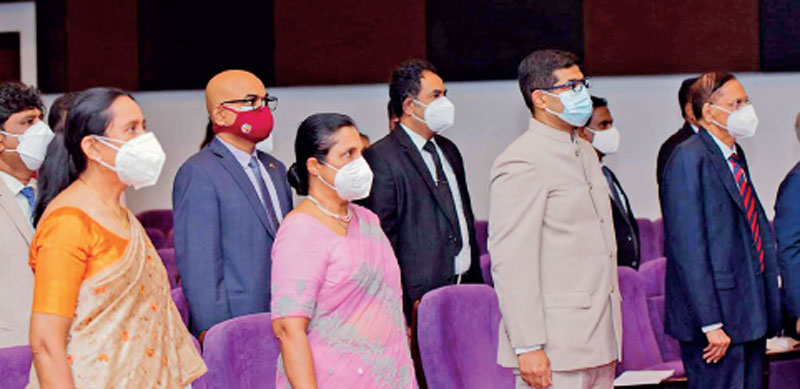Tuesday Feb 24, 2026
Tuesday Feb 24, 2026
Thursday, 25 November 2021 02:55 - - {{hitsCtrl.values.hits}}

|
Indian Acting High Commissioner Vinod K. Jacob addressing the symposium
|
Acting High Commissioner Vinod K. Jacob attended the Annual Research Symposium 2021 of University of Colombo on 23 November on the theme ‘Impactful Research through an Interdisciplinary Approach,’ which was also joined by Minister of Foreign Relations Prof. G. L. Pieris, Sr. Prof. Chandrika N. Wijeyaratne, Vice Chancellor of University of Colombo, distinguished alumni, scientists, faculty members and students.
Speaking as the Chief Guest on the occasion, Acting High Commissioner recalled the historic academic linkages between the two countries, including the visits of Nobel Laureate Gurudev Rabindranath Tagore to Sri Lanka. He conveyed that High Commission of India has recently institutionalised a Gold Medal in the name of Gurudev Rabindranath Tagore to recognise the highest academic record holder in the Sri Palee Campus of University of Colombo.
Highlighting the education reforms undertaken by the Government of India in the last few years, including New National Education Policy 2020, the Acting High Commissioner said that the contemporary challenges require innovative solutions which could be achieved through interdisciplinary approach.
In 2015 the Indian Department of Science & Technology (DST) under its Cognitive Science Research Initiative has developed a new research program – Science and Technology of Yoga and Meditation (SATYAM) which provides interface with Neuroscience, Medicine, Psychology, Philosophy, so on as an interdisciplinary approach.
He mentioned that owing to its immense knowledge capital, strong interdisciplinary approach, vibrant start-up ecosystem and public-private partnerships, India has moved to rank 46 in the Global Innovation Index in 2021, a significant jump from rank 81 in 2015. He also spoke about India’s ambition and commitment for combating climate change through concrete actions as articulated by Prime Minister Narendra Modi at COP26. These future steps called ‘Panchamrit’ or the five nector elements was a highlight at Glasgow in particular the target of net zero by 2070 and emphasis of renewable energy in the overall energy mix.
Acting High Commissioner said that with the establishment of Centre for Contemporary Indian Studies (CCIS) at University of Colombo, a multidisciplinary research centre, both the countries have successfully conducted several programs through an institutionalised network between the two countries.
Recalling the robust bilateral cooperation in the areas of renewable energy, climate change, disaster management and sustainable development, he invited all the scholars and academics to fully avail the opportunities put forward by both the countries for the advancement of research, innovation and betterment of society.